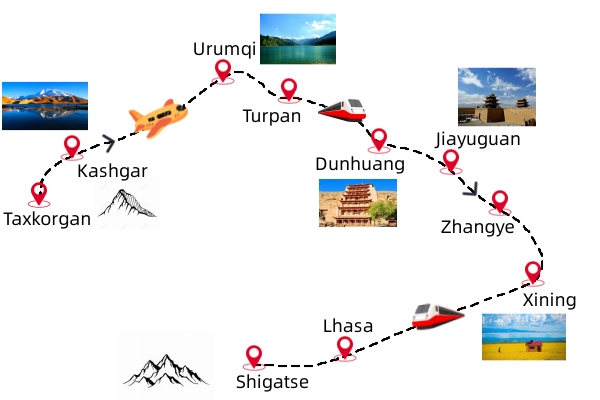20 Great Ideas For Picking China Tour Websites
20 Great Ideas For Picking China Tour Websites
Blog Article
Top 10 Tips To Explore Regional Cuisines In China
1. Explore the eight Culinary CulturesTip. Familiarize yourself the eight main Chinese cuisines: Sichuan Cantonese Hunan Anhui Fujian Fujian Fujian Each has their own flavors, techniques and cuisines.
Pro: Plan your culinary experiences according to your personal preferences.
Con: It can be difficult to be able to recall the specifics of every cuisine.
2. Enjoy the local specialties
Take a look at the famous dishes of the region you're visiting. For instance, try Peking Duck or Xiaolongbao (Shanghai) in Beijing, or Hot Pot (Chengdu).
Pro: It offers an authentic and culturally rich dining experience.
Con: It can restrict your ability to try other regional cuisines you're visiting.
3. Think about regional flavors
Tip: Sichuan dishes are spicy and dulling. Cantonese foods are light and fresh. Jiangsu food is sweet and delicate. Choose dishes based on your spice tolerance.
It can help you stay clear of ordering food that might not be what you prefer.
Con: Some flavor profiles may be acquired tastes and may require some experimentation.
4. Explore Street Food
There are unique street foods in each city, like Jianbing in Beijing (savory crepes), or Roujiamo in Xi'an (Chinese burgers). Try out some local snacks.
Pros Street food is inexpensive easy to prepare, and gives an insight into the local life.
Pro: Hygiene concerns can be an issue; select vendors who are well-respected.
5. Learn Basic Dining Etiquette
Tip: Get familiar with Chinese dining traditions, including sharing meals family-style. Beware of placing chopsticks into rice using the standing position.
Pro Improves the dining experience and shows respect for local tradition.
Cons: It can take time to adapt and learn new etiquette.
6. Request local recommendations
Locals will often have a good idea of the most popular places to eat and the best dishes in particular areas. Don't be afraid to ask the locals for tips.
Pro: Make sure you find hidden gems and stay clear of tourist traps.
Con: Communication can be difficult due to the language barrier.
7. Be prepared for unfamiliar ingredients
If you're in search of an innovative recipe, consider making experiments with strange ingredients. Explore new food items with curiosity.
Pro: Enhances appreciation for Chinese cuisine culture and broadens the palate.
Con: Certain meals might not be suitable for your taste or dietary requirements.
8. Accommodate Dietary Restrictions
Learn Mandarin phrases that can be used to communicate preferences and allergies.
Pro: A more secure dining experience that is tailored to your individual requirements.
Cons: Certain food items can be restricted in their options for people with certain dietary restrictions.
9. Pair food with regional drinks
Explore local drinks like tea from Fujian and baijiu north China.
Pro: It adds depth and compliments food.
Con: Strong flavors, especially baijiu, may not be suitable for everyone.
10. Avoid Overordering
Tip: Chinese dishes are typically served family-style, so order moderately and then add more as you need to.
Pros: Reduces food waste. Allows you to try several meals.
Con: Due to the numerous options available it is tempting to buy too many.
Pros to exploring regional food styles in China
Explore a variety of flavor and techniques, as well as the ingredients.
Cultural Insights: Develop your understanding of local customs and identities of the region.
Cost-Effective - A lot of local meals are inexpensive.
Memorable Experiences: Trying the most famous dishes from their country of origin will leave you with lasting memories.
Pros and Cons of Exploring regional cuisines in China
Hygiene Concerns. Certain street foods or restaurants aren't likely to meet international cleanliness standards.
Language Barriers. The menus, and the explanations of products may only be available in Mandarin.
Unfamiliar ingredient: Some flavors or textures are difficult for certain people.
Food restrictions for vegetarians, vegans, or people who suffer from food allergies might have a difficult time in certain areas.
By following these tips and remaining curious, you can enjoy the wide and delicious array of Chinese regional cuisines and overcome every obstacle in the process! Read the top view highlights of this attraction for site tips including wuxi a shining pearl of taihu lake, wuxi a shining pearl of taihu lake, shenzhen golf club, four gentlemen in chinese culture, tours for the disabled, shopping in shangri la, shanghai portman acrobatic show one of the best acrobatic shows in shanghai, eating in urumqi, ancient dapeng fortress, taishan tour maps and more.
Top 10 Tips On Tips In China
1. Be aware that tipping in China is not a custom.
Pros: It is cost-effective and is compatible with cultural norms.
Con: Could be odd for people who are used to tipping in their countries of origin.
2. Check for service charges
Tips: Most luxurious restaurants and hotels have a a service fee (10-15 percent) on the bill. This means that tipping is not necessary.
Pro: There is no need to figure out or leave an additional tip.
Con: Occasionally, charges for services might not be clearly displayed.
3. Make sure to only apply this suggestion in situations where it is appropriate.
Tip: In touristy areas or hotels with international standards, tipping can be expected, particularly by drivers, tour guides, or hotel staff.
Pros: A tiny gesture of appreciation can be a powerful way to show gratitude for the exceptional service.
Cons: Inconsistent practices may result in confusion regarding when to tip.
4. Offer Tips in a discreet Way
Avoid appearing rude or awkward by tying your tip subtly.
Pro: It prevents you from attracting attention.
Con: Some individuals may not accept the tip, which could lead to potential awkward moments.
5. Pay cash to tip
Tip: If you feel tipping should be included in the amount, you can pay it in cash rather than adding it. In China most payment systems do not allow tipping.
Cash is widely accepted and simple to make use of.
Con: It requires carrying small denominations of money, which can be a hassle.
6. Visit Tourist-Focused Businesses
Tipping is expected and appreciated in tourist destinations which are popular with Western tourist.
Pro: Aligns to the requirements of service providers that are familiar with Western norms.
Con: It promotes an gradual shift toward tipping, something that isn't necessary in cultures where it has been done for a long time.
7. Avoid Tipping Taxi Drivers
Tips Tipping taxi drivers is uncommon; instead, add a few dollars to the fare for convenience if necessary.
Pro: Shows respect and respect for local customs.
Con: The practice of rounded up may be misunderstood in places that aren't touristy.
8. When Tipping your Tour Guides
Tipping the driver or guide on a private tour or group tour is common in major cities like Beijing or Shanghai. A small amount (e.g. Y=50 to Y=100) are typically appreciated.
Pro: Recognizes and rewards good service.
Con: May sets expectations for the future of tourists to tip more.
9. Avoid Over-Tipping
Tips: If you choose to tip, a small amount (5-10 percent or less) is sufficient. It may seem excessive or unneeded to offer big tips.
Pros: You won't be a nuisance to the locals or pay too many dollars.
Cons: Tipping generously may make you feel uncomfortable if are familiar with it.
10. Research Ahead of Time
Before you arrive, be aware of the specific rules for tipping at the region or destination you are visiting. Certain provinces that cater to tourists or businesses might have different standards.
Pro: It will assist you in understanding local customs and avoid misinterpretations.
Cons: It is time-consuming to study each region or place separately.
Positive aspects of tipping practices in China
Cost savings: Save on overall expenses because you don't need to give a tip.
Cultural Adaptation: Alignment to traditional practices and fostering of respect and integration.
Simplicity - No need calculate or carry around extra cash.
Focus on Service - Encourages service providers to pay attention on quality and not just tips.
The Cons of Tipping Behavior in China
People who are used to tipping might find it difficult to adjust.
Unfortunate situations when you give a gratuity the wrong manner could create confusion or discomfort.
Changes in Expectations The tourism industry has introduced tipping in some regions, leading to a variety of methods.
Missed gratitude: Tipping could be a means to show your appreciation for a service.
Utilize these suggestions to ensure cultural respect as well as a great dining experience. Have a look at the top plan your trip to this site for website advice including naked marriage in china the most fashionable wedding style for the 1980s, xiang cuisine.html, the song of everlasting sorrow the famous long narrative poem, binhai aircraft copyright theme park in tianjin, chinese kites a phoenix shaped kite, snow beer the best selling beer in the world, weaponry of iron age iron cannon iron armour and warships, the origin and history of the mysterious chinese dragon, shopping in shangri la, shopping in nanjing and more.